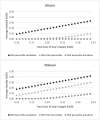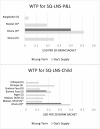Willingness to pay for small-quantity lipid-based nutrient supplements for women and children: Evidence from Ghana and Malawi
- PMID: 28960913
- PMCID: PMC6088232
- DOI: 10.1111/mcn.12518
Willingness to pay for small-quantity lipid-based nutrient supplements for women and children: Evidence from Ghana and Malawi
Abstract
Small-quantity lipid-based nutrient supplements (SQ-LNS) are designed to enrich maternal and child diets with the objective of preventing undernutrition during the first 1,000 days. Scaling up the delivery of supplements such as SQ-LNS hinges on understanding private demand and creatively leveraging policy-relevant factors that might influence demand. We used longitudinal stated willingness-to-pay (WTP) data from contingent valuation studies that were integrated into randomized controlled nutrition trials in Ghana and Malawi to estimate private valuation of SQ-LNS during pregnancy, postpartum, and early childhood. We found that average stated WTP for a day's supply of SQ-LNS was more than twice as high in Ghana than Malawi, indicating that demand for SQ-LNS (and by extension, the options for effective delivery of SQ-LNS) may be very context specific. We also examined factors associated with WTP, including intervention group, household socioeconomic status, birth outcomes, child growth, and maternal and child morbidity. In both sites, WTP was consistently negatively associated with household food insecurity, indicating that subsidization might be needed to permit food insecure households to acquire SQ-LNS if it is made available for purchase. In Ghana, WTP was higher among heads of household than among mothers, which may be related to control over household resources. Personal experience using SQ-LNS was not associated with WTP in either site.
Keywords: Ghana; Malawi; demand; small-quantity lipid-based nutrient supplements; willingness to pay.
© 2017 The Authors. Maternal and Child Nutrition published by John Wiley & Sons, Ltd.
Conflict of interest statement
The authors declare that they have no conflicts of interest.
Figures


Similar articles
-
A mixed method study exploring adherence to and acceptability of small quantity lipid-based nutrient supplements (SQ-LNS) among pregnant and lactating women in Ghana and Malawi.BMC Pregnancy Childbirth. 2016 Aug 30;16(1):253. doi: 10.1186/s12884-016-1039-0. BMC Pregnancy Childbirth. 2016. PMID: 27577112 Free PMC article.
-
Small-Quantity Lipid-Based Nutrient Supplements Increase Infants' Plasma Essential Fatty Acid Levels in Ghana and Malawi: A Secondary Outcome Analysis of the iLiNS-DYAD Randomized Trials.J Nutr. 2022 Jan 11;152(1):286-301. doi: 10.1093/jn/nxab329. J Nutr. 2022. PMID: 34543432
-
Impact of nutrient supplementation on maternal nutrition and child growth and development in Sub-Saharan Africa: the case of small-quantity lipid-based nutrient supplements.Matern Child Nutr. 2020 Dec;16 Suppl 3(Suppl 3):e12960. doi: 10.1111/mcn.12960. Matern Child Nutr. 2020. PMID: 33347727 Free PMC article. Review.
-
Maternal and Child Supplementation with Lipid-Based Nutrient Supplements, but Not Child Supplementation Alone, Decreases Self-Reported Household Food Insecurity in Some Settings.J Nutr. 2017 Dec;147(12):2309-2318. doi: 10.3945/jn.117.257386. Epub 2017 Oct 4. J Nutr. 2017. PMID: 28978680 Free PMC article. Clinical Trial.
-
Lipid-based nutrient supplements and linear growth in children under 2 years: a review.Proc Nutr Soc. 2017 Nov;76(4):580-588. doi: 10.1017/S0029665117000283. Epub 2017 Mar 13. Proc Nutr Soc. 2017. PMID: 28285607 Review.
Cited by
-
Preventive lipid-based nutrient supplements given with complementary foods to infants and young children 6 to 23 months of age for health, nutrition, and developmental outcomes.Cochrane Database Syst Rev. 2019 May 2;5(5):CD012611. doi: 10.1002/14651858.CD012611.pub3. Cochrane Database Syst Rev. 2019. PMID: 31046132 Free PMC article.
-
Food supplements to reduce stunting in Pakistan: a process evaluation of community dynamics shaping uptake.BMC Public Health. 2020 Jul 2;20(1):1046. doi: 10.1186/s12889-020-09103-8. BMC Public Health. 2020. PMID: 32616009 Free PMC article.
-
Multiple-micronutrient supplementation for women during pregnancy.Cochrane Database Syst Rev. 2019 Mar 14;3(3):CD004905. doi: 10.1002/14651858.CD004905.pub6. Cochrane Database Syst Rev. 2019. PMID: 30873598 Free PMC article.
-
Effects of vitamin and mineral supplementation during pregnancy on maternal, birth, child health and development outcomes in low- and middle-income countries: A systematic review.Campbell Syst Rev. 2021 Jun 26;17(2):e1127. doi: 10.1002/cl2.1127. eCollection 2021 Jun. Campbell Syst Rev. 2021. PMID: 37051178 Free PMC article.
-
Lipid-based nutrient supplements for maternal, birth, and infant developmental outcomes.Cochrane Database Syst Rev. 2018 Aug 31;8(8):CD012610. doi: 10.1002/14651858.CD012610.pub2. Cochrane Database Syst Rev. 2018. PMID: 30168868 Free PMC article. Review.
References
-
- Adams, K. P. , Lybbert, T. J. , Vosti, S. A. , & Ayifah, E. (2016). Using an economic experiment to estimate willingness‐to‐pay for a new maternal nutrient supplement in Ghana. Agricultural Economics, 47, 581–595.
-
- Adu‐Afarwuah, S. , Lartey, A. , Okronipa, H. , Ashorn, P. , Peerson, J. M. , Arimond, M. , … Dewey, K. G. (2016). Small‐quantity, lipid‐based nutrient supplements provided to women during pregnancy and 6 mo postpartum and to their infants from 6 mo of age increase the mean attained length of 18‐mo‐old children in semi‐urban Ghana: A randomized controlled trial. The American Journal of Clinical Nutrition, 103, 797–808. - PMC - PubMed
-
- Adu‐Afarwuah, S. , Lartey, A. , Okronipa, H. , Ashorn, P. , Zeilani, M. , Peerson, J. M. , … Dewey, K. G. (2015). Lipid‐based nutrient supplement increases the birth size of infants of primiparous women in Ghana. The American Journal of Clinical Nutrition, 101, 835–846. - PubMed
-
- Alderman, H. (2010). The economic cost of a poor start to life. Journal of Developmental Origins of Health and Disease, 1, 19–25. - PubMed
-
- Arimond, M. , Zeilani, M. , Jungjohann, S. , Brown, K. H. , Ashorn, P. , Allen, L. H. , & Dewey, K. G. (2015). Considerations in developing lipid‐based nutrient supplements for prevention of undernutrition: Experience from the International Lipid‐Based Nutrient Supplements (iLiNS) Project. Maternal & Child Nutrition, 11(Supplement 4), 31–61. - PMC - PubMed
Publication types
MeSH terms
Substances
LinkOut - more resources
Full Text Sources
Other Literature Sources
Medical

